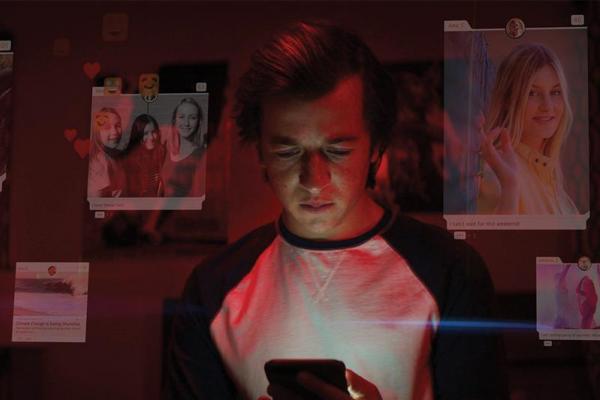THE PAST DECADE has seen an endless trickle of negative stories about social media—data breaches, Russian bots, cyberbullying, digital radicalization, etc.—so by now almost everyone knows that the amusement and convenience those platforms offer come with a downside. But now a new Netflix documentary, The Social Dilemma, is here to tell us one big thing: It’s worse than we thought. In fact, it’s worse than we could have possibly imagined.
In the film this alarm is raised by many of the very people who helped create the systems they now decry. We’re talking about the guy who invented the “Like” button for Facebook, the guy who designed the recommendation engine for YouTube, the fellow who invented the infinite scroll. One after another these mostly white, mostly male characters come on camera to tell us how badly their proudest accomplishments have gone awry.
The big problem these folks warn us about is that our smartphones constantly collect data (what we buy, what music we play, where we are, who we talk to, etc., ad nauseam) and that data is used to fuel a system of targeted alerts, notifications, and recommendations designed to keep us on a site for as long as possible and deliver us to advertisers who also have that data about us.
We see this system at work in those omnipresent targeted online ads for something we looked at yesterday. But, as bad as the advertising is, the side effects are even worse. According to The Social Dilemma, since around 2010 (when smartphones started becoming ubiquitous) self-harm and suicide, especially among young teenage girls, has gone up drastically. Facebook was used to provoke the ethnic cleansing of the Rohingya people in Myanmar. Of the people who joined extremist and hate groups on Facebook, 64 percent did so not because they went looking for bad actors, but because Facebook’s algorithm steered them there.
At the end of the movie, all the former tech industry insiders are asked, “What should people do about social media?” All of them say disable all notifications and never take recommendations. Most of them say keep your kids away from it for as long as possible, at least until 16. One of them says tax all data transactions to make the tech companies pay some of the social costs.
These are all good ideas, as far as they go, but I’m with Shoshana Zuboff (author of The Age of Surveillance Capitalism), who tells her interviewer that the business of selling personal data to advertisers should simply be banned, the way we’ve banned the buying and selling of human beings and human organs. If we did that, social media could still do the good it does, such as provide a digital infrastructure for human connections, but it would have to settle for the money from nontargeted general audience ads or go to a subscription model. And the rest of us would have to ask our own questions, think our own thoughts, and seek out for ourselves the information we really want to know.

Got something to say about what you're reading? We value your feedback!






